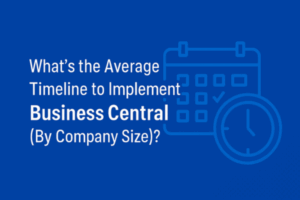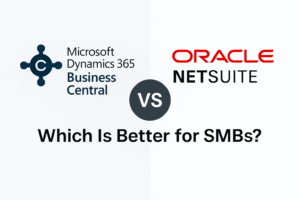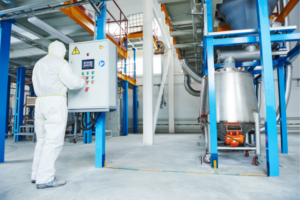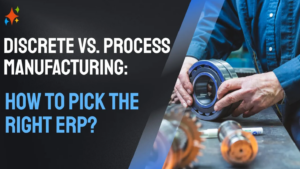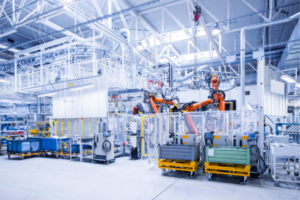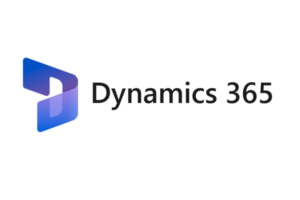Why Chemical Manufacturing ERP Cost Is Different From Generic ERP Pricing
Chemical companies have unique needs that impact cost. Unlike basic ERPs that cover finance and inventory, a chemical manufacturing ERP includes specialized tools like:
- Formula and batch management
- GHS-compliant labeling
- SDS tracking and version control
- Regulatory reporting
- Quality control workflows
- Lot-level traceability
These features require not just software functionality but also industry expertise during implementation, which increases the investment but delivers better long-term ROI.
Factors That Affect Chemical Manufacturing ERP Cost
Let’s look at what drives your ERP cost up or down:
1. Cloud vs. On-Premise Deployment
- Cloud ERP typically has a monthly subscription cost based on user count
- On-premise ERP involves upfront licensing fees and ongoing maintenance
- Cloud is usually more affordable upfront, while on-prem may offer more control
2. Number of Users
- Most ERP pricing scales with the number of users
- Expect higher costs if multiple departments (e.g. production, QA, warehouse, sales) need access
3. Implementation Complexity
- The more customization you need (formulas, compliance reports, integrations), the more expensive implementation becomes
- A typical chemical manufacturing ERP implementation may range from $50,000 to $250,000+ depending on scope
4. Licensing and Modules
- Core ERP licenses usually include finance, purchasing, and inventory
- Add-ons like batch processing, QC, or warehouse management add to the total chemical manufacturing ERP cost
5. Ongoing Support and Maintenance
- Cloud ERP often includes updates and support in the subscription fee
- On-prem ERP will require separate support contracts or in-house IT
6. Training and Change Management
- ERP projects succeed when users are trained properly
- Budget for user training, documentation, and change management support
Typical Cost Ranges for Chemical Manufacturing ERP (2026 Estimates)
To give you a ballpark idea, here’s what we typically see for different types of chemical manufacturing companies:
-
Small chemical manufacturers: $2,000–$6,000/month for software + $50,000–$100,000 for implementation
-
Mid-sized chemical manufacturers: $5,000–$15,000/month for software + $100,000–$250,000+ for implementation
-
Enterprise or complex operations: costs vary widely based on sites, integrations, compliance requirements, and customization, but typically exceed the ranges above
Quick note: These are general budgeting ranges. The most accurate estimate comes after a short discovery phase that confirms your workflows, formula and batch requirements, compliance needs, and integration scope.
Those ranges are helpful for budgeting, but the next question is what’s actually included. Here’s a simple breakdown of where ERP costs usually go in chemical manufacturing.
Chemical Manufacturing ERP Cost Breakdown (Licensing vs Implementation vs Ongoing Costs)
Software subscription/licenses (cloud)
-
Small chemical manufacturers: $2,000–$6,000/month
-
Mid-sized chemical manufacturers: $5,000–$15,000/month
Implementation services (core implementation work)
This is the bulk of the implementation budget (process mapping, configuration, testing, workflows).
-
Small implementation ($50k–$100k total): $27,500–$70,000
-
Mid-sized implementation ($100k–$250k+ total): $55,000–$175,000
Data migration (formulas, lots, SDS library)
-
Small: $2,500–$12,000
-
Mid-sized: $5,000–$30,000
Integrations (labeling, EDI, shipping, MES/LIMS)
Often one of the biggest swing factors.
-
Small: $5,000–$25,000
-
Mid-sized: $10,000–$62,500
Validation/compliance work (if applicable)
If you need extra controls/testing/documentation beyond the “standard” ERP setup.
-
Small: $0–$8,000
-
Mid-sized: $0–$20,000
Training/change management
The article calls out budgeting for training/change management as a real line item.
-
Small: $2,500–$12,000
-
Mid-sized: $5,000–$30,000
Ongoing support
- Cloud: support/updates are often included in the monthly subscription (so incremental support may be $0–$2,000/month depending on how much help you want).
- If separate support is needed (common for on-prem or heavy customization): budget ~10%–20% of your implementation cost per year (example: $5k–$20k/yr on a $50k–$100k implementation; $10k–$50k/yr on a $100k–$250k implementation).
While these ranges can vary by complexity and scope, they’re a helpful starting point for budgeting and vendor discussions. A short discovery phase with your ERP provider will refine the estimate based on your workflows, compliance needs, and growth plans.
Again, the exact chemical manufacturing ERP cost depends on your requirements, but these figures can help you start the conversation internally.
Hidden Costs to Watch For
Some vendors quote a low monthly fee, but that doesn’t always tell the full story. To avoid surprises, it’s important to ask upfront about these common hidden costs:
- Third-party add-ons or integrations: Many ERPs require separate tools for things like document management, EDI, or advanced analytics. These add-ons may come with their own licensing fees, support costs, and integration challenges.
- Data migration from legacy systems: Migrating your existing data such as formulas, inventory records, and historical transactions into a new ERP can be time-consuming and labor-intensive. Some vendors charge extra for data cleanup, validation, and import services.
- Custom reports or dashboards: If you need dashboards tailored to your QA, production, or compliance teams, expect additional costs for setup and configuration. Generic reports often don’t meet the needs of chemical manufacturers.
- Cost of future upgrades or expansions: Some vendors charge separately for system updates, new modules, or adding users. It’s important to understand how future changes will impact your chemical manufacturing ERP cost.
These hidden fees can add up quickly. Ask your vendor for a detailed pricing breakdown to ensure you’re evaluating the total cost, not just the entry-level price.
Transparency matters when evaluating your true chemical manufacturing ERP cost.
How to Make Sure You’re Getting the Right Value
Price is important, but so is value. A cheap ERP might seem like a good deal, but if it lacks the tools you need for batch processing, regulatory reporting, or SDS management, the cost of inefficiencies and workarounds can outweigh the savings.
When evaluating ERP options, look for a solution that offers:
- Out-of-the-box support for chemical manufacturing: This includes formula management, lot traceability, compliance reporting, and hazardous material handling without requiring expensive customizations.
- A vendor that understands your industry: Choose a provider with experience in chemical manufacturing so they can guide you through best practices and avoid common pitfalls during implementation.
- Scalable pricing based on your growth goals: Your ERP should grow with your business. Look for pricing models that allow you to start small and expand features, users, or locations as needed.
- A clear, upfront view of all costs: Make sure the vendor can provide a detailed quote that includes licensing, implementation, training, support, and any add-ons. This helps you avoid surprises and compare vendors fairly.
Ultimately, the best value comes from choosing an ERP that fits your chemical business—not just your budget.
Plan for the Long Term
So, how much does a chemical manufacturing ERP cost? You can expect a range from a few thousand dollars a month for a small business to six-figure implementations for more complex operations.
The right system will pay for itself by improving accuracy, reducing waste, simplifying compliance, and helping you grow. And with tools like Alchemy 365, you get all of that without overpaying for features you don’t need.
Want an estimate for your chemical manufacturing ERP cost with no pressure? Get instant pricing.
📌 Related Reading: The Ultimate Guide to ERP for Chemical Manufacturing



